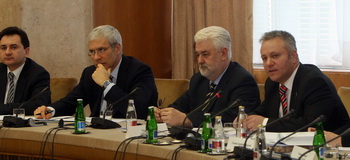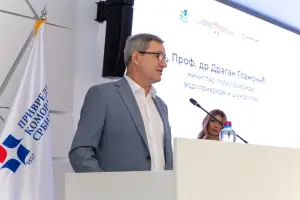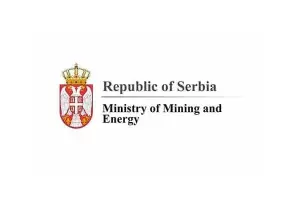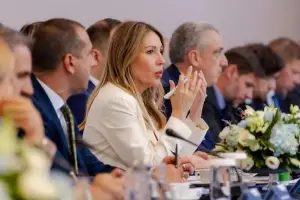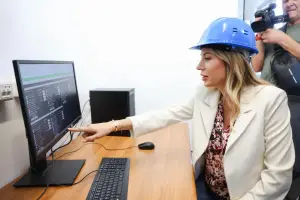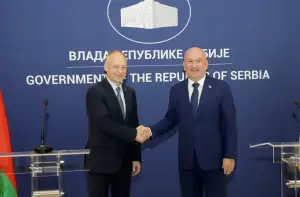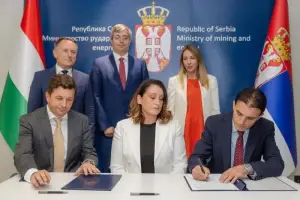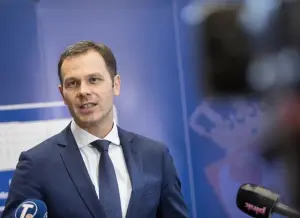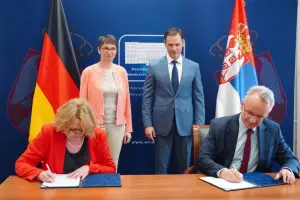Q:
A:
Financial crisis to be faced with unity, solidarity, continuity
Belgrade,
9 January 2009
Serbian Prime Minister Mirko Cvetkovic said today that the government will respond to the global financial crisis with unity, solidarity and continuity.
Speaking at a meeting between representatives of the Serbian government and employers and trade unions titled “Serbia against the Economic Crisis”, held at the Palace of Serbia, Cvetkovic said that the principle of unity means cooperation between all segments of society for finding and implementing solutions in the fight against the economic crisis.
The principle of solidarity means that the burden of difficulties will be distributed with social justice and the principle of continuity means that regular talks will be held and the crisis will be closely monitored, explained the Prime Minister.
He stressed that the Serbian government is trying its best to protect the most disadvantaged social groups from the effects of the crisis.
He said that the government will ensure that the current number of employed people does not drop by the end of this year.
The government will also take a number of incentive measures to secure an economic growth of 3 to 3.5% GDP this year, he said.
Cvetkovic said that €20 million was secured through the Development Fund, €250 million for small and medium-sized enterprises from the European Investment Bank and €500 million from the National Bank of Serbia (NBS), which will provide floating capital to the financial sector.
He stressed that one of Serbia’s basic problems is the foreign trade deficit and a major part of the incentive funds will be used to support exporters and domestic production.
He said that the government will also make efforts to save on all levels, including travel expenses, salaries to executives in state owned companies and the use of official vehicles.
He explained that today’s meeting continues the process of consultations in which various sides are taking part but this is for the first time that representatives of trade unions, the financial sector and the economy are participating together at a meeting.
NBS Governor Radovan Jelasic said at the meeting that in 2009 the chief priority and main challenge will be national savings.
He said that securing a GDP growth rate of 3.5% will be the second biggest challenge for the government and the economy, adding that measures are being prepared which will be implemented if growth is below the expected levels.
He said that maintaining stable prices is also important and the NBS will participate in efforts in this regard if possible.
He said that securing credit lines for banks will be a priority for the NBS, adding that this can be made possible by creating conditions for obtaining cheap loans from abroad.
Jelasic said that NBS will also support the economy in paying interest and will take other measures as well to ensure that bank profits remain in Serbia.
President Boris Tadic told the press that all social players must now show responsibility and awareness of the depth of the problem in order to avoid any permanent harm to the Serbian economy.
If Serbia is destabilised because of the crisis we will once again spend years regaining stability, instead of developing the country further, warned Tadic.
He stressed that the economic crisis is more serious than any other crisis in recent history, adding that not a single international institution can predict how long it will last and how the resulting issues will be solved.
This is why every government, institution, state and company must show a high level of responsibility, stressed the President, adding that although Serbia is not amongst the countries who suffered the greatest impact of the crisis, its stability might still be shaken.
It is now crucial to preserve jobs and stability. The crisis cannot be fought with a one-year plan, but it will be necessary to set up certain checks during the year so that the state is able to react to varying economic movements, he explained.
Tadic said that unfortunately, 2009 cannot be devoted to development, because this year everyone will have to try to preserve the existing system.
In 2009 we must maintain our economy’s capacity, said the President, adding that state reforms must be concluded, the economy must be restructured, efficient communications amongst institutions established and social dialogue ensured.
Tadic said that meetings such as this one, organised at the Prime Minister’s initiative, will be held regularly throughout the year.
Today’s meeting was also attended by deputy prime ministers Mladjan Dinkic and Bozidar Djelic, Finance Minister Diana Dragutinovic, representatives from the confederation of independent trade unions of Serbia Nezavisnost, the Serbian association of employers, the Serbian Chamber of Commerce, banking experts and businesspeople.
The principle of solidarity means that the burden of difficulties will be distributed with social justice and the principle of continuity means that regular talks will be held and the crisis will be closely monitored, explained the Prime Minister.
He stressed that the Serbian government is trying its best to protect the most disadvantaged social groups from the effects of the crisis.
He said that the government will ensure that the current number of employed people does not drop by the end of this year.
The government will also take a number of incentive measures to secure an economic growth of 3 to 3.5% GDP this year, he said.
Cvetkovic said that €20 million was secured through the Development Fund, €250 million for small and medium-sized enterprises from the European Investment Bank and €500 million from the National Bank of Serbia (NBS), which will provide floating capital to the financial sector.
He stressed that one of Serbia’s basic problems is the foreign trade deficit and a major part of the incentive funds will be used to support exporters and domestic production.
He said that the government will also make efforts to save on all levels, including travel expenses, salaries to executives in state owned companies and the use of official vehicles.
He explained that today’s meeting continues the process of consultations in which various sides are taking part but this is for the first time that representatives of trade unions, the financial sector and the economy are participating together at a meeting.
NBS Governor Radovan Jelasic said at the meeting that in 2009 the chief priority and main challenge will be national savings.
He said that securing a GDP growth rate of 3.5% will be the second biggest challenge for the government and the economy, adding that measures are being prepared which will be implemented if growth is below the expected levels.
He said that maintaining stable prices is also important and the NBS will participate in efforts in this regard if possible.
He said that securing credit lines for banks will be a priority for the NBS, adding that this can be made possible by creating conditions for obtaining cheap loans from abroad.
Jelasic said that NBS will also support the economy in paying interest and will take other measures as well to ensure that bank profits remain in Serbia.
President Boris Tadic told the press that all social players must now show responsibility and awareness of the depth of the problem in order to avoid any permanent harm to the Serbian economy.
If Serbia is destabilised because of the crisis we will once again spend years regaining stability, instead of developing the country further, warned Tadic.
He stressed that the economic crisis is more serious than any other crisis in recent history, adding that not a single international institution can predict how long it will last and how the resulting issues will be solved.
This is why every government, institution, state and company must show a high level of responsibility, stressed the President, adding that although Serbia is not amongst the countries who suffered the greatest impact of the crisis, its stability might still be shaken.
It is now crucial to preserve jobs and stability. The crisis cannot be fought with a one-year plan, but it will be necessary to set up certain checks during the year so that the state is able to react to varying economic movements, he explained.
Tadic said that unfortunately, 2009 cannot be devoted to development, because this year everyone will have to try to preserve the existing system.
In 2009 we must maintain our economy’s capacity, said the President, adding that state reforms must be concluded, the economy must be restructured, efficient communications amongst institutions established and social dialogue ensured.
Tadic said that meetings such as this one, organised at the Prime Minister’s initiative, will be held regularly throughout the year.
Today’s meeting was also attended by deputy prime ministers Mladjan Dinkic and Bozidar Djelic, Finance Minister Diana Dragutinovic, representatives from the confederation of independent trade unions of Serbia Nezavisnost, the Serbian association of employers, the Serbian Chamber of Commerce, banking experts and businesspeople.

